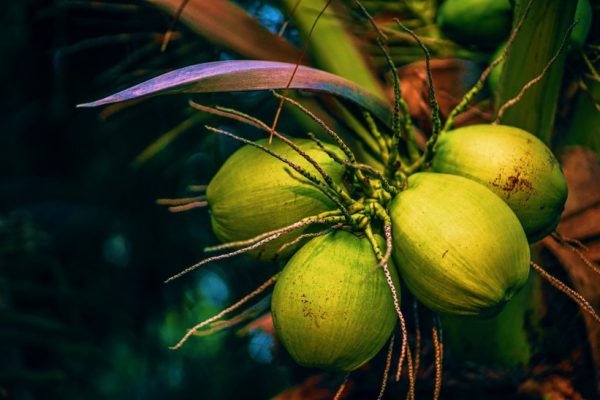
Coconut water and facts
Coconut water obtained from Cocos nucifera (botanical name) or coconut palm is actually the juice present inside the interior cavity or endosperm of young, tender coconut. Its water is one of the nature’s most refreshing drinks, consumed worldwide for its nutritious and health benefiting properties. Coconuts may be classified as a nut, seed and a fruit. In India coconut trees are called “Kalpavriksha of earth” ( means the tree that gives life with all its benefits).
The water is present inside a tender, green coconut. Inside, it’s clear liquid is somewhat sweet, and sterile and composed of unique chemicals such as sugars, vitamins, minerals, electrolytes, enzymes, amino acids, cytokine, and phyto-hormones. Depending on the size and cultivar type each coconut may contain upto 1000 ml of water. Tender coconut (5-7 months age) will have good amount of water whereas the ripened ones that we use for cooking will have less water and more endosperm. Coconut palm flourishes well under the costal tropical environments. A coconut tree may yield several hundreds of tender nuts each season. Different varieties of coconut palms are present throughout the world. Coconut trees flourishes well in coastal regions and in tropical conditions. The taste of coconut water depends on the climate too.
Health benefits of coconut water
Coconut water is a very refreshing drink to beat tropical summer thirst. It is packed with simple sugars, electrolytes, and minerals to replenish dehydration conditions inside the human body.
Research studies suggest that cytokinins (e.g., kinetin and trans-zeatin) in coconut water found to have significant anti-ageing, anti-carcinogenic, and anti-thrombotic (anti-clot formation) effects.
Coconut water is good source of balanced water for those patients who suffer from severe dehydration due to various reasons. It replaces the fluid loss from the gastrointestinal tract and to reduce the need for hospitalization. The osmolarity of tender coconut water is slightly greater than that of WHO recommended ORS (Oral Rehydration Therapy) solution. Presence of other biological constituents like amino acids, enzymes, minerals, and fatty acids may account for this higher osmolarity. Its water is rich in sugars and amino acids. This well-balanced fluid composition, along with much-needed calories, would be an ideal drink instead of any other kind of soft drink beverages available in the markets to correct dehydration conditions.
Coconut water is composed of many naturally occurring bioactive enzymes such as acid phosphatase, catalase, dehydrogenase, diastase, peroxidase, RNA-polymerases etc. In effect, these enzymes help in the digestion and metabolism. Despite being very light in consistency, its water proportionately has better composition of minerals like calcium, iron, manganese, magnesium, and zinc than some of the fruit juices like oranges. Its liquid is also a very good source of B-complex vitamins such as riboflavin, niacin, thiamin, pyridoxine, and folates. These vitamins are essential in the sense that the human body requires them from external sources to replenish.
Coconut water carries a very good amount of electrolyte potassium. 100 ml of water has 250 mg of potassium and 105 mg of sodium. Together, these electrolytes help replenish electrolyte deficiency in the body due to any kind of water loss (diarrhea, vomiting or dehydration). Fresh coconut water has a small amount of vitamin-C (Ascorbic acid); It provides about 2.4 mg or 4% of RDA. Vitamin C is a water-soluble ant-oxidant.
Coconut water and cholesterol:
It’s a low-fat health drink. Deemed a healthy alternative to sugar- and kilojoule-packed soft drinks and juices, pure coconut water is a natural beverage with no artificial additives or sweeteners. It’s cholesterol free, 99 per cent fat free, low in carbohydrates and naturally occurring sugars and has less than 100 kilojoules per 100ml (most flavored varieties use 100 per cent fruit extracts).
A study published in Fall 2006 in the “Journal of Medicinal Food” indicates that coconut water lowers total cholesterol and “bad” LDL cholesterol, while raising “good” HDL cholesterol.
- Start your day with a coconut water and fruit smoothie. Use tropical fruits such as banana, pineapple or mango to complement coconut’s mild nutty flavor. Add protein with almond butter, flax seeds or yogurt.
- Drink coconut water after exercising. Bruce Fife, author of “Coconut Water for Health and Healing” states that coconut water is “Nature’s Gatorade” and is superior to commercial sports drinks because of its high electrolyte content.
- Cook with coconut water. Make rice with coconut water instead of plain water, which will add flavor as well as all the health benefits. You could use coconut water as a base for soups — especially a soup with an Asian flair. Replace milk or water in your baked goods with coconut water — treats from banana nut muffins to pineapple upside-down cake would benefit from coconut water’s nutty taste.
Image courtesy: Photo by Nipanan Lifestyle on Unsplash
Author: Sumana Rao | Posted on: May 24, 2015
« Achieving longevity Tips for Better Health if you are a sedentary worker »






















Write a comment